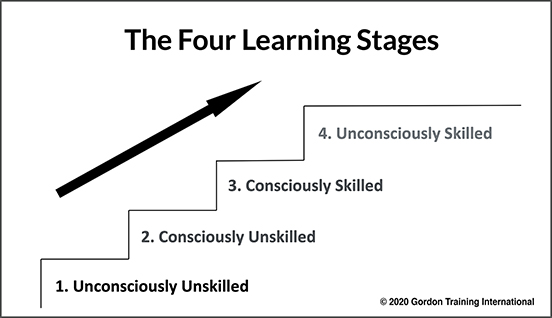
So hopefully you’ve been working hard to understand and apply many of the L.E.T. concepts, principles and skills. There are learning stages* each of us goes through when we are learning something new. This model can help you understand why learning can be a slow and frequently uncomfortable process. These are the four basic stages that participants find themselves in after the workshop:
Stage 1: Unconsciously Unskilled. We don’t know what we don’t know. We are inept and unaware of it. As a result, we may unknowingly use communication patterns with team members that disrupt or damage our relationships. You may have been at this stage before the start of the L.E.T. workshop.
Stage 2: Consciously Unskilled. Now we know what we don’t know. We become aware of the gap between where we are and how much we need to learn. For example, we become conscious of the negative effects of Roadblocks and the positive effects of Active Listening and I-Messages. You may have been at this stage many times during the L.E.T. workshop.
Stage 3: Consciously Skilled. Now we know how to use the skills but need to concentrate when we do. We make a real effort to avoid Roadblocks, to determine Problem Ownership, to notice signaling behavior, to send I-Messages instead of You-Messages. You may be at this stage now.
Stage 4: Unconsciously Skilled. Eventually, with lots of practice, we integrate the skill. Research shows that it requires between 1500-5000 repetitions of a skill to become unconsciously skilled. We expect that in such things as learning a new language or a new sport, but often react to early failures in using the L.E.T. skills with comments like: “It doesn’t work” or “I don’t have time for it”, or “It feels phony”. When leaders persist in using the skills, they start to be comfortable with them.
Now Active Listening, congruent self-disclosure and No-Lose Conflict Resolution seem more natural. Team members and others respond favorably because they feel heard, understood, appreciated, and satisfied. You may find that you can apply these skills in all areas of your lives and gradually they become integrated into all of your interactions and become the natural way of being with others.
At what stage do you think you are now?
*The Learning Stages were developed by former GTI employee and co-author of the T.E.T. book, Noel Burch.

